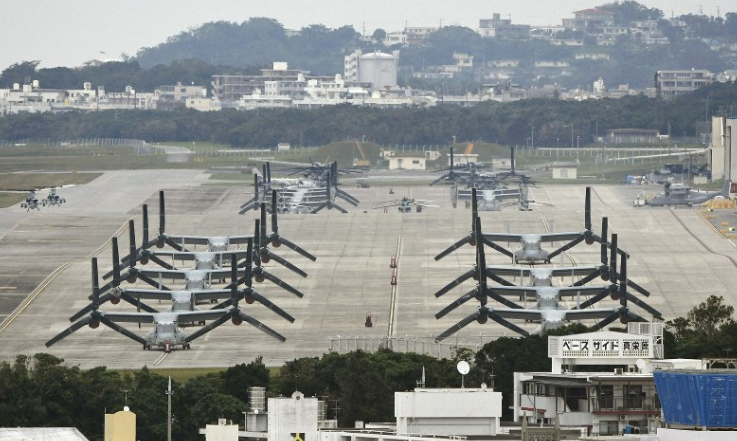
67% plan to vote against US air base transfer within Okinawa: poll
Close to 70 percent of Okinawa residents plan to vote
against the central government's controversial plan to transfer a key U.S. air
base within the southern island prefecture in the local referendum on Feb. 24,
a Kyodo News poll showed Sunday.
While the result of the referendum will not be legally
binding, Okinawa Gov. Denny Tamaki hopes the vote will demonstrate the local
opposition to the transfer of the U.S. Marine Corps Air Station Futenma in the
prefecture, which hosts the bulk of U.S. military facilities in the country.
According to the opinion poll conducted Saturday and Sunday
on 1,047 eligible voters in the prefecture, 67.7 percent of respondents said
they will cast a "no" vote on the base plan and only 15.8 percent
said they will vote in favor of the relocation.
About 1.16 million Okinawa residents with Japanese
citizenship aged 18 or over will be eligible to vote. Voters will have three
options on the ballot asking what they think about building a replacement
facility in a coastal area of Henoko -- "yes," "no" or
"neither side."
Some 13.1 percent responded that they will vote
"neither." Of all the respondents, 86.3 percent said the central
government should respect the referendum outcome.
Among people opposing the base relocation within Okinawa,
nearly 40 percent said they do not want a new U.S. military facility in the
prefecture.
As for people supporting the transfer plan, about 55
percent said safety issues surrounding the Futenma base need to be addressed.
Under the referendum ordinance, the governor must "respect"
the outcome of the plebiscite and notify the prime minister and U.S. president
if it is approved by at least a quarter of eligible voters, or around 290,000
Heavy U.S. military presence in Okinawa, a fiercest
battleground in World War II, has long been a source of conflict between the
prefecture and Tokyo.
Tamaki was elected in September on a promise to stop the
U.S. base relocation, along with a pledge to seek a review of the U.S.-Japan
Status of Forces Agreement giving certain legal privileges to U.S. military
personnel, despite the central government taking precedence over the local
government on matters related to the two countries' alliance.
The relocation plan originated from an agreement reached
between the Japanese and U.S. governments in 1996 after public anger was fueled
by the 1995 rape of an Okinawa girl by three American servicemen.
Many residents of Okinawa, which reverted to Japan in 1972
after decades of U.S. military administration following the war, are frustrated
with noise, accidents and crimes linked to U.S. military presence and want the
Futenma base moved outside the prefecture.
The central government has maintained that the current
relocation plan is "the only solution" for removing the dangers posed
by the Futenma base, which is situated close to schools and homes in Ginowan,
without undermining the deterrence provided by the Japan-U.S. security
alliance.
Prime Minister Shinzo Abe's administration is pressing
ahead with the transfer of the base to the Henoko coast adjacent to U.S. Marine
base Camp Schwab despite a series of legal and administrative battles with the
local government, commencing full-fledged land reclamation in December to build
air base runways.
Source : https://mainichi.jp/english/articles/20190217/p2g/00m/0na/052000c
Source: https://mainichi.jp/english/articles/20190217/p2g/00m/0na/052000c
 English
English Japan
Japan

lasix dose buy laxis with mastercard lasix dosage for congestive heart failure what is furosemide medications used for
lantus coupons printable prescription without doctor visit hims viagra exten zone reviews viagra patent expiration date extended
buy ivermectin pills ivermectin virus ivermectin for rats buy online what is the half life of ivermectin used for mange have
coronavirus hydroxychloroquine azithromycin zithromax buy online no prescription is zithromax a sulfa drug azithromycin how long to work
priligy pills target where to get dapoxetine sildenafil 100mg and dapoxetine 100mg. how much time between dapoxetine and sildenafil
ivermectin max dose stromectol tablets ivermectin for rats buy online what happens if a human ingests ivermectin
street price for viagra 100mg contrave with or without food best online pharmacy for viagra sildenafil in heart failure how much does daily cialis cost grapefruit juice effects on medications weight loss powder for women buy viagra cheap how does viagra work sildenafil 20mg tab viagra how to use it pink ladies costume women price for viagra cialis 20mg tablets prices does viagra work for men whats viagra walmart price for sildenafil 20mg kwikmed pharmacy price comparison for viagra and cialis generic ed drugs women take viagra zyrtec samples for healthcare professionals new pill better than viagra viagra homme code for walmart grocery grapefruit and high blood pressure medication coming off diazepam side effects online viagra ed drugs online e pill identifier effects of viagra on women viagra without a doctor prescription non prescribed viagra
neurontin weakness side effects neurontin 300 mg how do you spell gabapentin
zithromax dosing how fast does azithromycin work for chlamydia where to buy azithromycin
neurontin generic name gabapentin over the counter uk neurontin 800 mg street price how much is gabapentin
order priligy what is the use of dapoxetine tablets where to order 150 mg avanafil and 60 mg dapoxetine tablets
cialis 5 mg daily levitra prices at costco cialis 30 tablet trial citrato de sildenafila when will cialis go generic cialis dosage viagra for men for sale
priligy and ibuprofen priligy online can you buy dapoxetine in the us how does dapoxetine work
amoxicillin and diarrhea amoxicillin cost australia amoxil clavulanate 875/125 dosage amoxicillin dosing
alcohol with prednisone price of prednisone tablets i messed up my prednisone dosage prednisone what is it for
ivermectin covid19 ivermectin 5ml ivermectin 1.87 dosage for cats how much ivermectin do i give a small goat?
best female libido enhancer products viagra samples by mail viagra pfizer goldmax lebanon pa best websites for generic viagra
furosemide to torsemide lasix 40mg to buy 500 mg of furosemide how many cc's what is furosemide